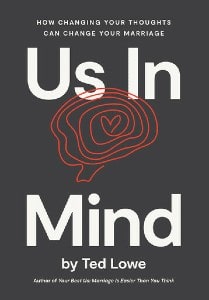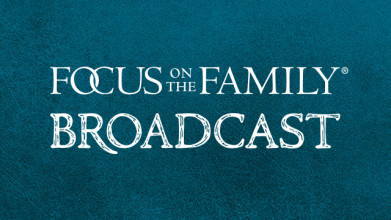Preview:
Ted Lowe: Just looking at your spouse, again, just listening to them, just being present with them, just celebrating them. Even this comfort of looking at their face and mimic, not mock, but mimic the look on their face that you’re getting them, “I’m getting where you’re coming from, whether that’s frustration or excitement, wherever you are on that continuum,” but just to pause and take a breath and say, “You know what? I don’t have to figure all this out. The God of the universe loves me and wants to help me reset my mind, and I don’t have to change my spouse, I just need to change my mind.”
End of Preview
John Fuller: Hmm, that’s Ted Lowe and he shares encouragement and help for married couples today on this Best of 2023 edition of Focus on the Family with Jim Daly. We’ll hear more of his insights and we’re so glad you’ve joined us. I’m John Fuller.
Jim Daly: Well, I’m pretty sure most experts would agree that there is great power in thinking positively, and before you say, “That’s new age,” no, no, it’s Biblical. Embracing a positive mindset can boost your confidence, uh, ward off depression and anxiety, how ’bout that, help you manage stress. There’s a whole lot of benefits like that that research has shown.
John: Mm-hmm.
Jim: Uh, but did you know that thinking more positively of your spouse, uh, can change your marriage? How ’bout that? It’s pretty straightforward, right?
John: It’s seems to be, yeah.
Jim: You think positively, you’re gonna have a positive marriage. Today, we’re gonna help you better understand how to shift, uh, in your thoughts from the negativity to the positivity and help you have a healthier and happier marriage, and, yes, it’s Biblical.
John: Hmm. And we’ve got Ted Lowe here. He’s a senior communicator at Family First and, uh, he’s also a popular speaker, writes books, and we’ll be talking about one of those today. It’s called, Us In Mind: How Changing Your Thoughts Can Change Your Marriage. Stop by the website, that’s focusonthefamily.com/broadcast or call 800, the letter A, and the word FAMILY, for your copy.
Jim: Ted, welcome to Focus.
Ted: Thanks for having me, you guys.
Jim: (laughs) It’s fun. It, uh, always is good to come and help John and I with our-
Ted: (laughs)
Jim: … respective marriages. So, this is therapy for us, and I’m sorry, we just tried to do it for free. (laughs)
Ted: Okay, I’ll do what I can.
Jim: (laughing)
Ted: I’ll do what I can.
Jim: Let me as you, it’s kind of funny, uh, you kinda got thrown into the- the marriage end of pastoring, ’cause you … I guess you were standing in a room and somebody said, “Do we have a volunteer to run the marriage ministry?” Everybody left and you had your air buds in or something.
Ted: Mm-hmm, that- that’s more truth indeed.
Jim: (laughs)
Ted: Uh, I got hired as the director of married life at our church when Nancy and I had been married for six years at the time, and we weren’t even that great at it. So, we look back now and we- we don’t know who’s crazier, the church for offering me the position or me for saying yes.
Jim: So, is that, like, a God thing or what- what went down?
Ted: I think that it was. I mean if nothing else, I was enthusiastic. I thought, “I’m gonna learn everything there is.” So, yeah, uh, we do think it was a God thing and, uh, has been a great journey ever since, and this was 2001.
Jim: Yeah, good. So, you’re at it now and you’re a professional.
Ted: Oh, I don’t know about that.
Jim: (laughs)
Ted: I don’t know about that. Uh, do we ever get there? Hmm, I-
Jim: I- I would hope people would understand, we’re always a work in process, even those of us that talk about it often as part of our vocation.
Ted: Yeah.
Jim: It’s so true. Listen, you have done some inter- interesting things in Us In Mind, and I- I wanna highlight a few of those, obviously, over the next 25, 30 minutes. Thr- you identified three mysteries of marriage that led you on that journey. Uh, what are the three? Let’s go right to the jugular.
Ted: You know, it was funny. Uh, 2020, for some reason I had a little bit more time on my hands to do a little research. Well-
Jim: Yeah, because you couldn’t go grocery shopping? (laughs)
Ted: Yeah. So, I’ll just stay home and research. But there were … after doing this for, you know, 20 plus years I thought, “I’ve got a couple of questions that I want to get to the bottom, uh, of.” I would wonder why is it that some couples will come to a marriage retreat or hear a broadcast like this, or, uh, read a marriage book and they’ll apply what they’re learning, while another couple will see the same thing, read the same thing and won’t apply anything? So, I started digging into that piece, and then, why is it that some couples will get divorced without even seeking any counsel first? That was blowing me away. And then, why is it some couples thrive, some couples get stuck, and some couples just survive? What’s the difference? And what it all came down to in the research was that happy couples think in a way that unhappy couples don’t, and it was asking the question of, what is it that couples that would say, “We’re doing great in our marriage.” So, so much of the research, which is very important, is around couples, um, who are struggling, which that’s very important, but I wanted to know, what about the couples that are really crushing it, that are really doing great, and all the research was pointing back to the same thing, that our thoughts matter most to our marriage-
Jim: Mm-hmm.
Ted: … which, I’d never thought about it that way.
Jim: Yeah.
Ted: And- and I think it’s the thing a lot of us are not thinking about, like I didn’t …
Jim: Yeah.
Ted: No one taught me in school or- or church, or that mattered that I needed to question my thoughts. I just believed every thought that I had, and scripture’s very clear that that should be the case.
Jim: (laughs) Taken captive.
Ted: Oh, taken captive.
John: Mm-hmm.
Jim: It’s the opposite.
Ted: No autopilot thinking, and I- I-
Jim: Yeah.
Ted: … never thought about that. So, they’re- happy couples just think in a way that unhappy couples don’t.
Jim: You use a term in there, in terms of that positivity called, uh, positive illusion.
Ted: Yeah.
Jim: Now, what does that mean?
Ted: So, Dr. Helen Fisher did a fascinating study, um, brain scans on couples who reported being madly in love after average of years. So, these were long-term couples, and there are three areas of the brain that had higher level of activity than average, and one of them is the part of our brain that’s responsible for this thing called positive illusions, and it’s the ability to focus on what you do love and not focus on what you don’t.
Jim: Huh.
Ted: And these couples that were happy, uh, especially the long-term couples, they just had this ability that I’m gonna see the good and I’m going to pretty much ignore the bad. Now, red flags are going up everywhere right now, as people are listening-
Jim: (laughs) Yeah.
Ted: … and I understand that, but-
Jim: Just turning a blind eye.
Ted: Just turning a blind … but we … it’s not that at all, but it is … it’s the ability to see what we love and not- focus less on what we don’t, and these couples had that.
Jim: Yeah. I mean, it’s really fascinating. Le- let’s hit that issue of the theological basis for this. I teased it in the beginning-
Ted: Yeah.
Jim: … but you’re the pastor. So, when you’re talking about positivity in marriage, uh, that can be misconstrued.
Ted: Hmm.
Jim: So, what’s the theological underpinning for the idea that, no, being positive in your marriage is Biblical?
Ted: Well, if you go to Philippians 4:8 and say just run your spouse through the Philippians 4:8 filter, which starts with, you know, “Whatever is true, whatever is noble, whatever’s pure, whatever’s right.” And so, the fact that that verse starts with true is really a great protector of anyone who’s being abused psychologically or physically. If that’s true, then that can’t be. Right?
Jim: Hmm.
Ted: So, it starts with … So, it- this is not about rose-colored glasses. This is not about just saying, “I’m gonna fake it or not communicating,” but it starts with “What’s true, and then it goes to what’s noble, what’s pure, what’s right, what’s lovely. If anything is worthy of praise, think on those things.” And so, I think when people had a running list, you know, what do you love about your spouse, I think it postures us to love our spouse in a way that we would never naturally love them on our own.
Jim: Yeah. The, uh, just the simplicity of, um, being positive, why does it have such a strong impact on us? I mean, I ca- it’s kind of a duh question, but somebody might be thinking it.
Ted: Well, I think, you know, one study shows that 80% of our thoughts are negative, and 90% of them are repetitive, and that we have between 16,000 to 60,000 thoughts a day.
Jim: Wow.
Ted: So, with all that going on, with all that negativity going on, when we stop and we get positive and we take captive, you know, when we transform our marriage by transforming our mind, by renewing our minds, it- it changes things. We start to see things through a different lens, and that’s why Scripture’s so clear, and I got so excited about that, just to think that our relationship with Jesus can really transform us by us feeling His love for us and remembering that, and focusing on that, and focusing on who He is. It’s just powerful.
Jim: Yeah. You know, one thing I’ve noticed, and I … this isn’t to stereotype, but I do see it most often in women, the sense of guilt if something doesn’t go right, or if something wasn’t done right. They’re very quick to put that on themselves. (laughs) I think our egos, for men, are just a little big, and w- it’s always the other guy’s fault, just like Adam in the garden. Right? “It was the woman you gave me, Lord.”
Ted: (laughs)
Jim: And to that extent, um, that person that can feel like I’m not good enough, um, that woman that takes on that burden that, you know, uh, “Maybe my husband’s better than I am,” or she perceives that-
John: Hmm.
Jim: … and she says her negativity is, “I’m not good enough.” Um, how does she deal with that? How does she get that bucket emptied and fill up the, you know what, God has given me this man as a husband-
Ted: Hmm.
Jim: … and this is good, and we can move forward,” and she doesn’t need to wear that guilt?
Ted: That’s a great question. You know, the second chapter of the book is What Do You Think About Yourself?
Jim: Mm-hmm.
Ted: Um-
Jim: It’s typically more critical-
Ted: It’s typic-
Jim: … I would think.
Ted: I absolutely think. In fact, that is one of the things, personally, that I’ve struggled with, uh, and I … in fact, I call him Fred in my head-
Jim: (laughs)
Ted: … and Fred-
Jim: The other guy?
Ted: The other guy.
Jim: I’ve golfed with him. (laughs)
Ted: I think all this would … Listen, Fred is not kind to me. And so, what I started to find out, as we s- started teaching this, um, at marriage retreats and different things, I have so many people come up and say, “I have a Fred. I have a inner critic in my head,” and here’s the thing with Fred. Fred can become louder than the voice of God.
Jim: Hmm.
Ted: So, if you are to process those thoughts, to answer your question about somebody that’s really struggling, I give a exercise in the book to kinda … I say, “This is how you get Fred out of your head, and this is where you start hearing more of God’s voice and less of Fred’s voice,” and it’s been that one of the things that people have responded to the most, and you say, “What in the world does what do you think about yourself, what does it have to do with your marriage?” Well, it’s got everything, ’cause it- it increases our anxiety when we listen to Fred, it increases our self-doubt, uh, we’re not as present, we’re not as available, we’re not as a good a listener. They’re not living with a best version of our- ourselves. We tend to want God-sized things from our spouse that they can’t give us when we’re listening to Fred, but when we lean back and remember and focus on Who’s we are, it’s transformational. It really is.
John: Well, this is Focus on the Family with Jim Daly, and our guest today is Ted Lowe, and, uh, we’re so grateful for, uh, what he’s captured in his book, Us in Mind: How Changing Your Thoughts Can Change Your Marriage. Contact us for your copy. It’s 800, the letter A, and the word FAMILY, or stop by focusonthefamily.com/broadcast.
Jim: Ted, let me ask you, this might be the question of our time together, but how- how can we start to change our mindset toward our spouse if it, you know, someone’s listening or watching, going, “Yeah, that’s me. I- I have … 80% of my thoughts are negative about myself and about my spouse.” How do you arrest that and get that under control and put Fred and Freddie or Fredericka back in the box and have a more positive, joy-filled life?
Ted: Well, if we just focus on the what do you think about yourself, there’s five intentional thoughts in the book, but if we just focus on what do you think about yourself, I give an exercise in there, and this exercise has been proven. It’s been around for 30 years. It’s just nobody knew it. But it’s basically you name your Fred, you give your Fred a name, Fred or Fredericka-
Jim: (laughs)
Ted: Uh, you give them a name, and what that does is it separates those thoughts from you, it gives them distance from them, and then you write down those negative thoughts, and when you see those on a piece of paper, when you see them and you capture them, and you see how concrete they are, you can see more easily why they’re not true, why they’re not kind, and would Abba really say this to me? Would my Abba really say this to me?
Jim: Mm-hmm.
Ted: And then, I give people categories. What types of thoughts does Fred typically use with you? Is he a mind reader? You know, is he saying, “Oh, I know what they were really thinking about you”? Is it, um, a fortune teller, “Oh, I can tell you how this is gonna go”? I mean, Fred tends to have, I call them side hustles, different ways of talking to people. And then, finally, just say, write down what would your Abba say back to you, and this is where you pull in Scripture, what would my Abba say to this?”
‘Cause, yes, He might convict you, but He’s never gonna condemn you.
Jim: Oh, right.
Ted: And so, when you see this in front of you, it just changes things and it’s pretty, uh, powerful because it’s … it can feel pretty instant-
Jim: Yeah.
Ted: … when you see that, and you go, wait a minute, this is not true of me.
Jim: Yeah.
Ted: Right? This is not true.
Jim: You and Nancy, uh, your wife, you have a phrase that you share to keep this kind of on track. Help me with that phrase. What is it?
Ted: So, we have a phrase at our house that we say, “We know tragedy, and this ain’t it.” Yes, I know that’s poor grammar, but it, you know, gives you a little more punch.
Jim: It’s gets to the point.
Ted: It’s gets to the point.
Jim: Okay. I like it.
Ted: Um, we experienced, uh, several years of grief. And so, somewhere along the way, there came this phrase that we used called “We know tragedy, and this isn’t it.” And so, it will … it’ll come up with different things. Like, for instance, I took my daughter to … (laughs) I took my daughter on trip with me to New York and, uh, we decided we were already in New York. Let’s just go to Manhattan, you know, ’cause that’s what we do, the Teds. We make impulsive decisions, and I booked a hotel, but I booked it on the wrong night, and then when I got there, they said I couldn’t cancel it and they were gonna charge me double.
John: Ugh.
Ted: And my wife is very good with finances. So, I called her and told her about the mistake, and she could have very easily and justifiably gotten really frustrated with me, but instead, she said, “You know what? We know tragedy and this isn’t it,” and I think sometimes people wi- will withhold seeing the best in their spouse because they say, “If I don’t get frustrated with them, they’re gonna keep doing these things over and over,” and I say, “That’s not marriage. That’s parenting, and I don’t even think it’s great parenting.” To say, look, here’s the thing, I didn’t need her to make me feel bad about that. I already felt bad about that. In fact, I’m terrified to order anything online now, and I will spin my computer around and go, “Can I push purchase here?”
John: (laughs)
Ted: ‘Cause I w- … but I look back at that, and that allowed me to have a day with my daughter. That was a gift from her.
Jim: Oh, yeah.
Ted: Uh, it was a gift of grace from her, uh, and because we do know tragedy and when you s- when you do know tragedy, and I’m sure a lot of people listening, they would say the same thing, that when you put that lens, it eliminates the petty stuff, and I watch people get so frustrated with their spouse about mistakes that they would never get frustrated with somebody else about. Right? I watched a young couple coming up from the beach, little kids, you could tell it had been a long day. Mom hands dad a beach bag, “Hold this.” Dad sits it up on the fence. Immediately, f- beach bag falls, stuff goes everywhere. Mom is not happy and she is letting dad know, and I thought, I don’t know their story, obviously, but I thought if her friend had been with her and her friend had let the bag drop, would she have responded the same way?
Jim: Yeah.
Ted: I don’t think so, because friend would have gotten a new friend. So, I think when we can just see the best, it eliminates all this petty stuff. If you can just see the best in their mistakes.
Jim: Yeah, I-
Ted: It changes things.
John: Hmm.
Jim: The- the point I was gonna make, I’ve thought about that because I think, when that intimacy is high, like a spouse, that you can treat that spouse like yourself. So, when I see something-
John: Yeah.
Jim: … like that happen, what comes to my mind is that’s the internal negativity-
Ted: Hmm.
Jim: … that she has or he has toward himself, and feels comfortable enough-
Ted: Right.
Jim: … to express that to their spouse. Wouldn’t do it to a friend.
Ted: Right.
Jim: But they would be so upset at themselves-
Ted: Mm-hmm.
Jim: … that that bag tipped over and I was so dumb to not put it on the ground. Why was I so stup- … and then bang.
Ted: Mm-hmm.
Jim: It just goes right-
Ted: Hmm.
Jim: … to the spouse.
Ted: Hmm, absolutely.
Jim: You know, I guess that you could say that’s one flesh, but-
Ted: Hmm.
Jim: … definition. But I- I think that’s the comfortableness of their guilt, I think. What do you think of that?
Ted: Hmm. I think you’re right, and I think some people’s Fred, it … they have a different type of Fred. Their Fred says, “If people had only listened to you, if she would only do it your way, if he would only do it your way. When is he ever gonna learn?” It … they play the blame game. So, you’ve got kind of a different type of Fred that- that’s forcing all this frustration that’s more outwardly focused, and I think that can be what happens sometimes. People are living in this level of frustration, and you mentioned, like, there’s a safety in marriage and we can use that safety for intimacy or we can use that safety, uh, to hurt them, ’cause what do people say? “I talk to them like that because I can.” Well, because you can is the very reason you shouldn’t.
John: Mm-hmm.
Ted: Right?
John: Yeah.
Ted: We reserve so much of the best of us for even strangers.
Jim: Do you have time to even flash that through your mind? I mean, our minds work incredibly fast.
Ted: Hmm.
Jim: They’re amazing, what God has created, but for you to say, “Whoa. Okay, how would I treat my friend before I say this to my spouse?” That’d be a great question.
Ted: Absolutely.
Jim: I think I’m gonna try to do that, but just hopefully it can catch me before my mouth speaks.
Ted: Well, there’s a chapter on what do you think about your response, because when your brain is triggered by your spouse, it’s this … called the amygdala. It’s the same part of your brain that’s triggered w- if you were to accidentally put your hand on a hot stove.
Jim: Yeah. Boom!
Ted: Boom! The frontal lobe, which is where all your logic is, goes out to lunch. So, people are so reactive. So, I … the amygdala’s great, but it’s too efficient when it comes to marriage. And so, James 1:19 and 20, this is where I love how Scripture and science, they have no conflict whatsoever on this. You know, if your brain is triggered and you’re not thinking for a solid eight seconds, what does James 1:19 and 20? “Be quick to listen, slow to speak, and slow to become angry.” I will say, personally, the most regrettable moments-
Jim: Mm-hmm.
Ted: … in my life as a dad and as a husband is when I did not pause.
John: Hmm.
Ted: So, the … one of the five intentional thoughts is just pause. Let your brain come back online. Let the logical part of your brain … invite God into the process. Like people, “Where does God fit into marriage?” In those moments when your husband drops the bag. Take a breath, take a deep breath, pause, and then respond the way you want to in logical … in those logical times.
Jim: Yeah. Hi- hit those five.
Ted: Gotcha. So, the- the first one starts off, uh, with remember who you are, and you’re a child of God. The second one is see the best, which is your spouse. The third one is choose empathy. The fourth one is pause, and the fifth one is love first.
Jim: Yeah. That’s good.
Ted: Yeah.
Jim: Love first. I like that.
Ted: Yep.
Jim: You know, uh, I’m thinking of application here. So, these are just kinda down at the ground level for me, but-
Ted: Yeah.
Jim: … there’s times, with Jean and I, where, you know, she’s feeling something so deeply ’cause she’s so well wired and connected-
Ted: Hmm.
Jim: … and I’m just not keeping up with her, uh, or I’m running from it, ’cause I don’t know how to manage it myself.
Ted: Hmm.
John: (laughs)
Jim: But … but in that context, that advice that you might have for just the normal couple that that is part of it, where the guy is not connected-
Ted: Hmm.
Jim: … what do you do in that situation?
Ted: This is the chapter, perhaps, for us that is the freshest, for us, in terms of application, ’cause Nancy and I are both fixers.
Jim: (laughs) Okay.
Ted: We are both fixers and I re- … she said to me one time, I would typically, if she told me anything was bothering her, I immediately, I was like a relational Bob the builder. Can I fix it? Yes, I can.
John: (laughs)
Ted: And she would share something going on with … and I’m immediately into fix-it mode, and then she would not respond well, and I would make her emotions about me, and I would say, “You don’t respect my opinions.” Instead, one time, she’d finally puts words to it. She goes, “I don’t need you to fix this. I need you to feel this,” which I wish I could say, “Oh, I’ve not been meeting that emotional need. My mistake.” I think I probably rolled my eyes and thought, “Well, that sounds ridiculous.” I told her, I said, “That’s like me seeing you broken down on the side of the road in the minivan with the kids, me driving up and going, ‘Aww, that looks really tough. I’ll see you at home.’” That’s wh- how that feels with me-
Jim: Hmm.
Ted: … with not … but for her, she said, “I don’t want you to fix this. I want you to feel this.” And so, we just use the passage, “Rejoice with those rejoicing. Cry with those who cry.”
Jim: Let’s go to the last thing we can cover today, and I’m just thinking about that wife or that husband who’s in a spot saying, “Yeah, but you don’t know my spouse.”
Ted: Mm-hmm.
Jim: What are some things they can do pretty immediately to try to arrest that negativity and move it in a more positive, Biblical direction?
Ted: And that-
Jim: The big question.
Ted: It- it is a big question, but I think if we just rewind and we go back to Philippians 4:8 to stop, because the whole book is written to individuals. Nowhere do I say, “As a couple, you need to do this,” ’cause I wanted to give power to the individual to change their thoughts. So, so often, you know, I’ll teach at marriage retreats and people are always coming up to me, “I’m so glad my husband was here to hear- hear that,” or “I’m so glad my wife was here to hear that.”
Jim: (laughs)
Ted: Or it’s like, “No, no, I’m just gonna be talking to you.”
Jim: Yeah.
Ted: And so, I just talk to the individuals. And so, I think when we go back and you go, okay, I’m gonna reset my mindset about my marriage, and I’m gonna reset my mindset about my spouse, and you start listing, and you gotta write them down. When you see them, it’s different. You list what are those things about them, and it starts wiring you in a different way-
Jim: Wow.
Ted: … to respond-
Jim: Yeah.
Ted: … in a different way to each other … to, look, you know, empathy … What’s so fascinating about empathy, and even eye contact can be so simple. The research shows that when you make eye contact with your spouse, it creates empathy in your brain for them.
Jim: Hmm.
Ted: And so, just looking at your spouse again, just listening to them, just being present with them, just celebrating them. Even this comfort of looking at their face and mimic, not mock, but mimic the look on their face that you’re getting them, “I’m getting where you’re coming from, whether that’s frustration or excitement, wherever you are on that continuum,” but just to pause and take a breath and say, “You know what? I don’t have to figure all this out. The God of the universe loves me and wants to help me reset my mind, and I don’t have to change my spouse. I just need to change my mind.”
Jim: Well, and that’s critical, what you’re saying. It’s your list, not their list.
Ted: Right.
Jim: You’re not creating the list about them.
Ted: Right.
Jim: You’re creating the list about yourself-
Ted: Absolutely.
Jim: … and where you’re at, and I … you know, that’s so true and so refreshing that you don’t have to worry, not only for yourself, but the other person-
Ted: Hmm.
Jim: There’s enough to worry about within you, with your relationship with the Lord to try and improve.
Ted: Sure.
Jim: And that- that, to me, is one of the best things-
Ted: Hmm.
Jim: … you can do in marriage, is don’t- don’t set out to change the other person.
Ted: Hmm.
Jim: Just work on your own attitude.
John: That brings us to conclusion of our Best of 2023 conversation with Ted Lowe on today’s episode of Focus on the Family. Ted has, uh, great encouragement, uh, there at the end. You don’t have to figure everything out all on your own.
Jim: That’s right, John, and thankfully, it’s not our job to change our spouse. (laughs) I mean, God is with us as we grow together to become more like Him. That’s the goal, and I so appreciate Ted’s message. And I hope you know, here at Focus on the Family, we want to help you have a thriving relationship, a Christ-centered marriage is our mission, here at Focus on the Family. That’s why we cover content like this, and that’s why we offer our Hope Restored marriage intensives for couples who feel their relationship is in real trouble.
John: Yeah, and, uh, Hope Restored is doing such great work for marriages. Um, uh, we’ve talked about it a little bit, Jim, Dena and I went. Um, we weren’t at a point of deep desperation, but we sure did need a lot of help just to kinda right size and level set things, and we learned, uh, so much that we’re still using every day. It really has improved our relationship significantly. Those marriage counselors are so qualified and their so insightful in helping couples concentrate on their relationship and, uh, work through the issues.
Jim: And now, we have five locations, including, uh, Cave Creek, near Scottsdale, Arizona, outside of Austin, Texas, Branson, the original, uh, Michigan, and down in Rome, Georgia. So, there’s accessibility around the country for couples-
John: Mm-hmm.
Jim: … and we want to make it easy for you to get the marriage help that you need. Here’s the great news. 80% of those marriages that show up at Hope Restored are doing better and the couples are still married two years later. 80%. I think it’s one of the best things happening for marriage restoration in the country today-
John: Mm-hmm.
Jim: … and if you’re in that spot, we want you to get in touch with us. Uh, there’s no reason you need to linger in a dying marriage. Let our counselors help you, uh, have a marriage that is thriving in Christ.
John: And in addition to Hope Restored, we have so many resources and tools here to help you in your relationship.
Jim: Well, one of those great tools is Ted Lowe’s terrific book, Us in Mind: How Changing Your Thoughts Can Change Your Marriage, and it’s full of great examples on how to take that first step to seeing your spouse in a new way, and you can get that directly from us, here at Focus on the Family, and when you do, the proceeds go right back into ministry. So, if you’re gonna get the book, (laughs) get it through Focus and be part of the ministry help that so many people need. Episodes like this one, uh, have become “best of” programs because of the impact they have on others. Uh, this is all ranked by response. So, you, the listener, have responded in a larger number than the rest of the programs, and we just want to, uh, lift this up to you again. We’ve also run the numbers, here at Focus, and surprisingly, uh, you know, about, um, just short of 6 million people a week will listen to Focus on the Family, but less than 1% of the listeners actually pay it forward and support the ministry. I hope we can count on you, and maybe we could double that number from 1 to 2%, not for our benefit, but for the Kingdom’s benefit. That way, we can reach more, uh, marriages that are stressed, more parents who need help, save a baby’s life. Uh, there’s so much that your dollar does here at Focus on the Family.
John: Well, join the support team. Let’s double the number of people that contribute to this ministry and double the impact and the number of lives affected by Focus on the Family’s ministry. Donate today and, uh, give a gift of any amount and we’ll send a copy of Ted’s book to you. It’s called Us in Mind and, uh, it’s our way of saying thanks and putting this really, uh, terrific book in your hands.
Jim: And John, it’s great. Right now, we have friends that are gonna double those gifts. So, if you make a $25 gift, it becomes $50, a $50 becomes $100, and it’s just a fun way to spur giving on so, again, together we can reach more families for Christ.
John: Donate generously today as you can and, uh, request a copy of that book, Us in Mind, when you call 800, the letter A, and the word FAMILY. 800-232-6459, or you can, uh, donate online and request the book at focusonthefamily.com/broadcast. Well, plan to be with us tomorrow as we hear from Lee Strobel. He has ideas about what Heaven will be like and shares why it’s important to think about Heaven.
Lee Strobel: When that happens, when you have a brush with death like that and you don’t know, “Am I gonna close my eyes and open them in the next world?” You don’t know, this becomes very relevant. (laughs) You know? All of a sudden, the idea of Heaven is not some ephemeral, uh, you know, vague kind of idea that you think about maybe once in a while. It becomes the dominant thought in your mind. And so, I thought, you know, I believe based on the Bible, as a Christian, what happens when we die, but I’m also a skeptic.


















